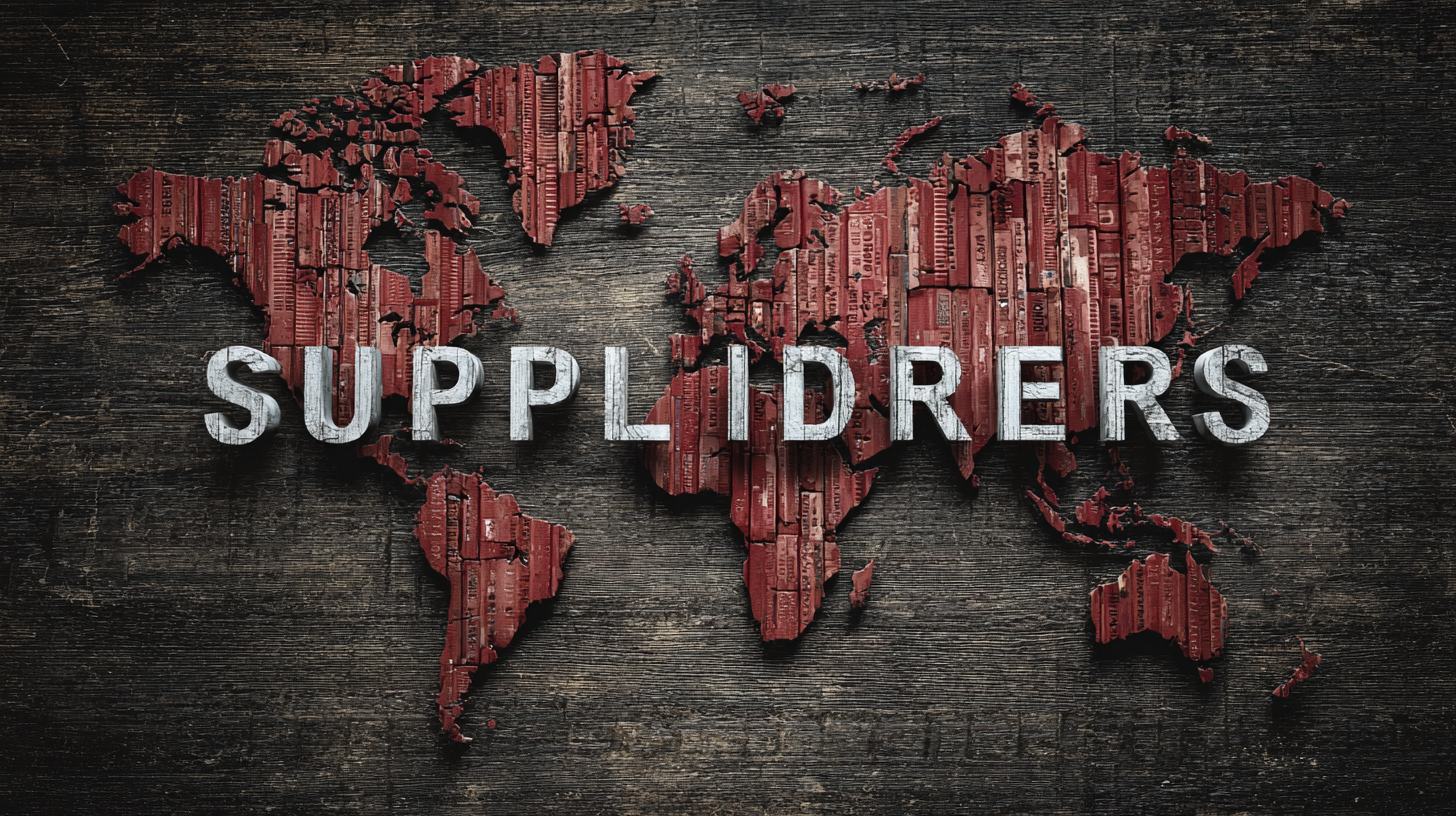
Overcoming Challenges with Finding the Best Suppliers: A Global Procurement Guide
In today's global marketplace, securing the right suppliers has become increasingly complex, as organizations face unprecedented challenges in navigating fluctuating supply chains and increasing competition. According to a recent study by McKinsey & Company, 80% of businesses have reported significant supply chain disruptions, underscoring the critical need to strategically identify and collaborate with reliable suppliers.
 Furthermore, a report from Deloitte highlights that efficient supplier management can boost operational efficiency by up to 25%, making it essential for procurement professionals to explore alternative supplier options to mitigate risks and enhance resilience.
As organizations strive to overcome these challenges, implementing a global procurement strategy that emphasizes diverse sourcing and robust supplier relationships is more crucial than ever. This blog will explore various alternatives for finding the best suppliers, equipping procurement leaders with insights and strategies to thrive in a dynamic business environment.
Furthermore, a report from Deloitte highlights that efficient supplier management can boost operational efficiency by up to 25%, making it essential for procurement professionals to explore alternative supplier options to mitigate risks and enhance resilience.
As organizations strive to overcome these challenges, implementing a global procurement strategy that emphasizes diverse sourcing and robust supplier relationships is more crucial than ever. This blog will explore various alternatives for finding the best suppliers, equipping procurement leaders with insights and strategies to thrive in a dynamic business environment.
Assessing Supplier Capabilities: Key Metrics for Procurement Professionals
Finding the right suppliers is a pivotal aspect of global procurement, yet it often presents several challenges. Assessing supplier capabilities effectively requires a keen understanding of key metrics that reflect their performance and reliability. Metrics such as quality control standards, delivery timelines, and cost efficiency are fundamental to evaluating a supplier's ability to meet your organization's needs.
Tips: When assessing suppliers, it's vital to consider their historical performance data. Look for consistency in delivering quality products on time while adhering to budget constraints. Additionally, don’t underestimate the importance of communication. A responsive supplier can save countless hours in problem-solving, ensuring smoother operations.

Another critical area is sustainability practices. As global awareness of environmental issues grows, organizations must prioritize suppliers who demonstrate commitment to sustainable practices. This not only enhances your brand image but also aligns with consumer expectations for corporate responsibility.
Tips: Implement a scoring system to rate potential suppliers across various metrics. This structured approach allows for a more objective comparison, facilitating better decision-making. Ensure to revisit and update your criteria regularly to adapt to changing market dynamics and organizational goals.
The Role of Technology in Streamlining Supplier Selection Processes
In today's global market, the complexity of supplier selection demands innovative solutions to streamline processes. According to a 2021 study by Deloitte, 83% of procurement professionals believe that technology significantly enhances their ability to evaluate suppliers effectively. The adoption of digital procurement tools, such as advanced analytics and artificial intelligence, has transformed how organizations identify and engage with potential partners. These technologies not only facilitate thorough assessments but also allow businesses to optimize their supply chains by predicting supplier performance based on historical data.
Furthermore, a report from McKinsey highlights that companies utilizing automated supplier selection systems experience a 30% reduction in sourcing time. These systems analyze vast amounts of data, enabling organizations to make informed decisions aligned with their strategic goals. Digital platforms also foster better collaboration among stakeholders, leading to faster negotiations and improved relationships with suppliers. As businesses navigate an increasingly competitive landscape, leveraging technology in the supplier selection process is not merely advantageous but essential for achieving operational efficiency and sustaining growth.
Global Sourcing Strategies: Overcoming Cultural and Logistical Barriers
Navigating the complexities of global sourcing requires a keen understanding of cultural and logistical barriers that can hinder procurement success.
Organizations seeking to establish fruitful relationships with suppliers across different countries must first invest time in understanding local customs, communication styles, and negotiation tactics. Cultural differences can lead to misunderstandings if not addressed, potentially derailing partnerships before they even begin. For instance, what is considered polite negotiation in one culture may be perceived as aggressive in another. Thus, companies must adapt their strategies to resonate with their global partners, fostering trust and cooperation.
Logistical challenges also play a significant role in global procurement.
From transportation issues to regulatory compliance, the path to securing reliable suppliers is often fraught with difficulties. Companies can mitigate these risks by conducting thorough market research and employing local experts who understand the intricacies of import/export regulations. Additionally, investing in technology that enhances supply chain visibility can help organizations track shipments and manage inventory more efficiently. By overcoming these cultural and logistical barriers, businesses can not only find the best suppliers but also build sustainable relationships that drive long-term success in the global marketplace.
Evaluating Alternatives: Cost vs. Quality in Supplier Relationships
When navigating the global procurement landscape, the balancing act between cost and quality in supplier relationships becomes pivotal. According to a recent report from Deloitte, 79% of procurement leaders emphasize the importance of quality over cost in supplier selection. This insight underlines the notion that while cost-saving is essential, compromising on quality can lead to greater expenses down the line due to defects, recalls, or diminished customer satisfaction.
Additionally, a study published by McKinsey reveals that companies that invest in high-quality suppliers can achieve a competitive edge, often realizing up to 30% higher profitability compared to their lower-cost counterparts. These statistics highlight the critical need for businesses to evaluate suppliers not merely on price but on their ability to deliver consistent, high-quality products and services. This strategic approach not only strengthens supplier relationships but also enhances overall supply chain resilience, ultimately driving long-term success in a volatile marketplace.
Overcoming Challenges with Finding the Best Suppliers: A Global Procurement Guide - Evaluating Alternatives: Cost vs. Quality in Supplier Relationships
| Supplier Region | Cost Factor (Score 1-10) | Quality Factor (Score 1-10) | Delivery Time (Days) | Sustainability Practices (Yes/No) | Customer Service Rating (1-5) |
|---|---|---|---|---|---|
| North America | 7 | 8 | 5 | Yes | 4 |
| Europe | 6 | 9 | 4 | Yes | 5 |
| Asia | 8 | 7 | 10 | No | 3 |
| South America | 5 | 6 | 15 | Yes | 4 |
| Africa | 4 | 5 | 20 | No | 2 |
Mitigating Risks: The Importance of Diversified Supplier Networks
In today's interconnected global market, businesses face a multitude of risks associated with supplier reliance. Diversified supplier networks play a crucial role in mitigating these risks, ensuring that companies are not overly dependent on a single source. According to a 2021 Deloitte report, organizations that employed a diversified supplier strategy reported a 20% increase in operational resilience during supply chain disruptions, highlighting the importance of having multiple suppliers across various regions.
Moreover, sourcing from a diversified pool of suppliers also enhances negotiation power and encourages innovation. A study by the Procurement and Supply Chain Management Institute found that companies with a robust mix of suppliers saw a 15% reduction in procurement costs, as competition among suppliers drives better pricing and value. Additionally, diverse supplier networks help companies adapt to market changes more swiftly, allowing them to respond proactively to fluctuations in demand or supply chain interruptions. By integrating a diversified approach to supplier management, businesses can not only safeguard their operations but also position themselves for sustainable growth in an ever-evolving marketplace.

